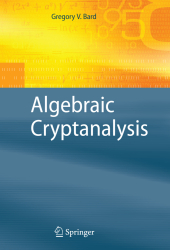 Neuerscheinungen 2014Stand: 2020-02-01 |
Schnellsuche
ISBN/Stichwort/Autor
|
Herderstraße 10
10625 Berlin
Tel.: 030 315 714 16
Fax 030 315 714 14
info@buchspektrum.de |

Gregory Bard
Algebraic Cryptanalysis
2009. 2014. xxxiii, 356 S. 235 mm
Verlag/Jahr: SPRINGER, BERLIN; SPRINGER US; SPRINGER 2014
ISBN: 1-489-98450-X (148998450X)
Neue ISBN: 978-1-489-98450-0 (9781489984500)
Preis und Lieferzeit: Bitte klicken
This book is one of the first to cover SAT-solvers and how they can be used in cryptanalysis. It includes chapters on finite field linear algebra and the equicomplexity of matrix operations.
Algebraic Cryptanalysis bridges the gap between a course in cryptography, and being able to read the cryptanalytic literature. This book is divided into three parts: Part One covers the process of turning a cipher into a system of equations; Part Two covers finite field linear algebra; Part Three covers the solution of Polynomial Systems of Equations, with a survey of the methods used in practice, including SAT-solvers and the methods of Nicolas Courtois.
Topics include:
Analytic Combinatorics, and its application to cryptanalysis
The equicomplexity of linear algebra operations
Graph coloring
Factoring integers via the quadratic sieve, with its applications to the cryptanalysis of RSA
Algebraic Cryptanalysis is designed for advanced-level students in computer science and mathematics as a secondary text or reference book for self-guided study. This book is suitable for researchers in Applied Abstract Algebra or Algebraic Geometry who wish to find more applied topics or practitioners working for security and communications companies.
Introduction: How to Use this Book.- Cryptanalysis.- The Block Cipher Keeloq and Algebraic Attacks.- The Fixed-Point Attack.- Iterated Permutations.- Stream Ciphers.- Linear Systems Mod 2.- Some Basic Facts about Linear Algebra over (2).- The Complexity of (2)-Matrix Operations.- On the Exponent of Certain Matrix Operations.- The Method of Four Russians.- The Quadratic Sieve.- Polynomial Systems and Satisfiability.- Strategies for Polynomial Systems.- Algorithms for Solving Polynomial Systems.- Converting MQ to CNF-SAT.- How do SAT-Solvers Operate?.- Applying SAT-Solvers to Extension Fields of Low Degree.


